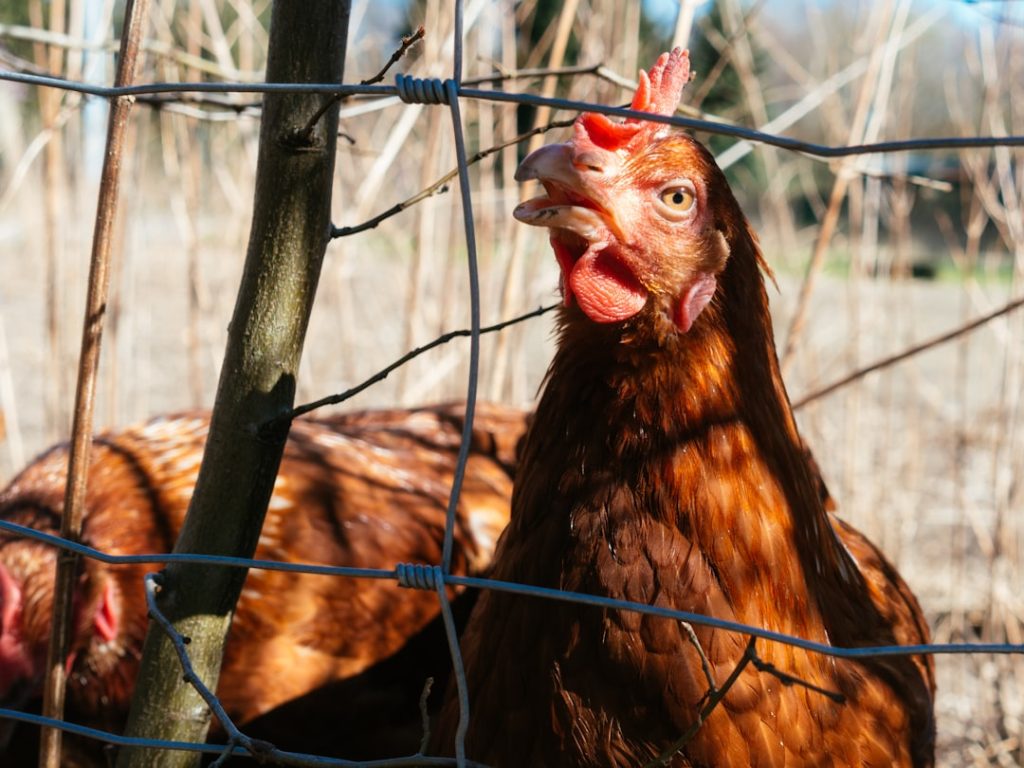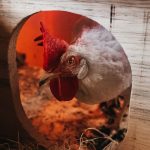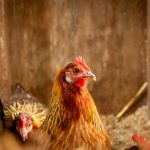Chickens are naturally curious and social animals that explore their surroundings and interact with one another. They are easily startled and can become skittish in unfamiliar or threatening situations. Understanding these behaviors is essential for protecting them from potential predators.
Recognizing their natural tendencies allows for better anticipation of their reactions and implementation of appropriate safety measures. Chickens are creatures of habit, often following routines and returning to the same roosting spots nightly. This predictable behavior has both advantages and disadvantages for predator protection.
It allows for anticipation of their location and implementation of security measures, but also makes them vulnerable to predators that may learn their patterns. Understanding these behaviors enables proactive steps to protect chickens and create a safe, secure environment for them to thrive.
Table of Contents
- 1 Implementing Physical Barriers
- 2 Using Natural Deterrents
- 3 Creating Distractions
- 4 Employing Repellents
- 5 Training and Supervising
- 6 Seeking Professional Help
- 7 FAQs
- 7.1 What are some effective ways to keep chickens off your garden?
- 7.2 Why is it important to keep chickens off your garden?
- 7.3 Are there any plants that can help repel chickens from the garden?
- 7.4 What are some natural deterrents for keeping chickens off the garden?
- 7.5 How can I create a designated foraging area for my chickens to keep them out of the garden?
Key Takeaways
- Chickens are naturally curious and will explore their surroundings, including areas they are not supposed to be in.
- Physical barriers such as fences and netting can effectively keep chickens out of certain areas.
- Natural deterrents like citrus peels, coffee grounds, and vinegar can be used to discourage chickens from entering specific areas.
- Creating distractions with shiny objects or noise can divert chickens’ attention away from forbidden areas.
- Repellents such as commercial sprays or homemade mixtures can be used to keep chickens away from certain areas.
Implementing Physical Barriers
Implementing Effective Barriers
One of the most effective ways to protect your chickens from predators is by implementing physical barriers around their coop and run. This can include installing sturdy fencing around the perimeter, burying the fence underground to prevent digging predators, and adding a secure roof to prevent aerial attacks. Additionally, reinforcing the coop with strong locks and latches can help deter predators from gaining access to your chickens.
Maintaining the Integrity of Barriers
Another important aspect of implementing physical barriers is ensuring that there are no gaps or weak spots that predators can exploit. Regularly inspecting the fencing and coop for any signs of wear and tear, and promptly repairing any damage, is essential for maintaining the integrity of the barriers.
Creating a Safe Environment
By creating a strong and secure enclosure for your chickens, you can significantly reduce the risk of predator attacks and provide them with a safe and protected environment.
Using Natural Deterrents
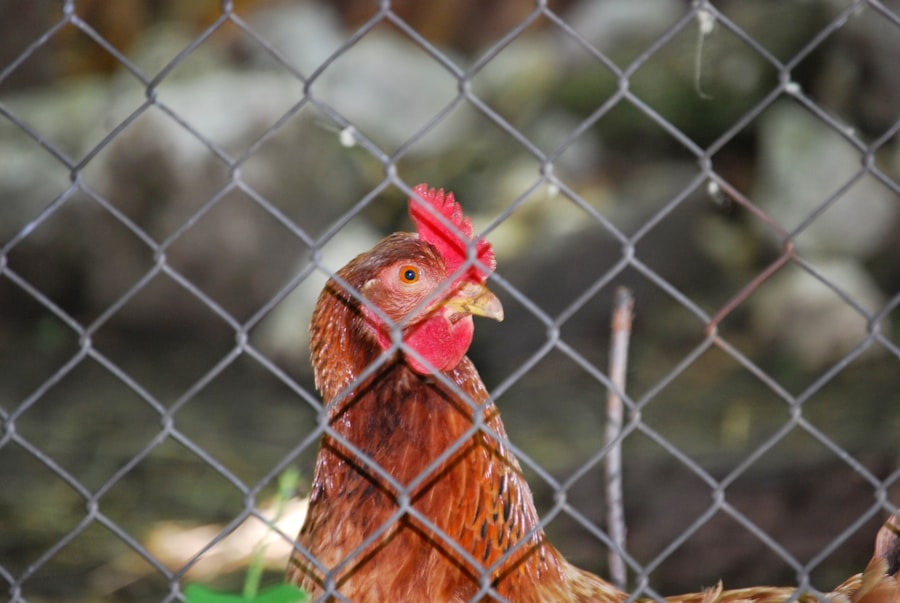
In addition to physical barriers, using natural deterrents can also help protect your chickens from predators. For example, planting thorny bushes or shrubs around the perimeter of the coop can create a natural barrier that deters predators from approaching. Additionally, using predator urine or scent repellents, such as coyote or fox urine, can create the illusion of a predator presence and discourage other animals from entering the area.
Another natural deterrent is the presence of guardian animals, such as dogs or geese, that can help protect the chickens from potential threats. These animals can serve as an early warning system and deter predators from approaching the coop. By incorporating natural deterrents into your chicken protection strategy, you can create an additional layer of defense against potential threats and help keep your chickens safe.
Creating Distractions
Creating distractions can also be an effective way to protect your chickens from predators. For example, hanging shiny objects, such as CDs or aluminum foil strips, around the coop can create visual disturbances that may deter predators from approaching. Additionally, setting up motion-activated lights or sound devices near the coop can startle potential threats and discourage them from getting too close.
Another way to create distractions is by providing alternative food sources for potential predators. For example, setting up a bird feeder or scattering birdseed in a different area of your property can divert the attention of predators away from your chickens. By creating distractions that draw predators away from the coop, you can reduce the likelihood of an attack and provide your chickens with an added layer of protection.
Employing Repellents
In addition to natural deterrents and distractions, employing repellents can also help protect your chickens from predators. There are a variety of commercial repellent products available, such as sprays or granules, that are designed to deter specific types of predators. These products often contain natural ingredients, such as garlic or pepper, that create an unpleasant scent or taste for predators and discourage them from approaching.
Another option is to create homemade repellents using ingredients such as hot pepper spray or vinegar, which can be sprayed around the perimeter of the coop to create a barrier that predators are reluctant to cross. By employing repellents, you can create an additional line of defense against potential threats and help keep your chickens safe from harm.
Training and Supervising
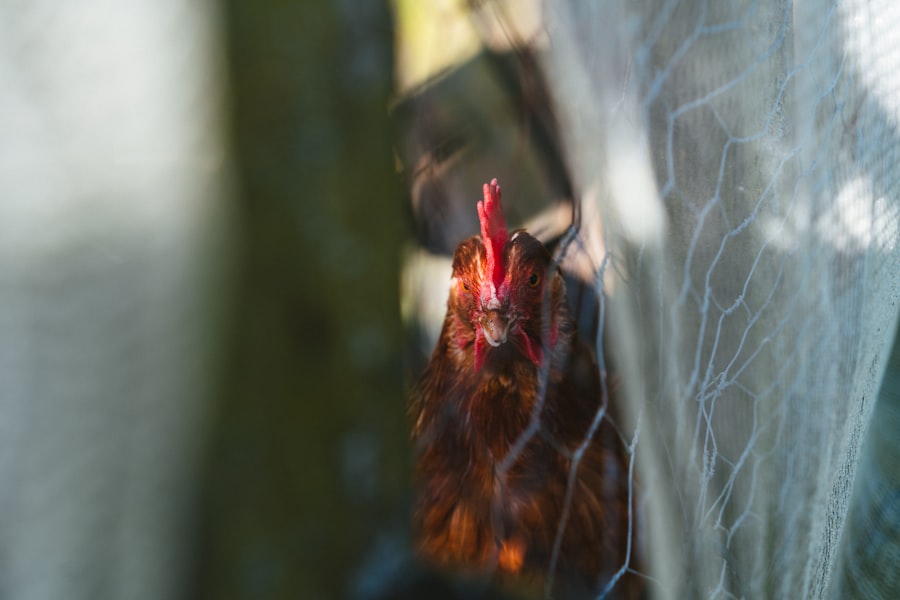
Training for Safety
Training and supervising your chickens can also play a crucial role in protecting them from predators. By training your chickens to respond to certain cues or signals, such as returning to the coop at a specific time or seeking shelter when they sense danger, you can help them avoid potential threats.
Supervision and Intervention
Additionally, supervising your chickens during free-range time can allow you to intervene if you notice any signs of danger or potential predator activity. This proactive approach can help prevent predator attacks and ensure the safety of your flock.
Understanding Local Predators
Another aspect of training and supervising involves educating yourself about the behaviors and habits of local predators in your area. By understanding the specific threats that your chickens may face, you can take proactive measures to protect them and minimize the risk of predator attacks.
Developing Awareness and Resilience
By training and supervising your chickens, you can help them develop awareness and resilience that will contribute to their overall safety and well-being. This holistic approach to predator protection can give you peace of mind and help ensure the health and happiness of your flock.
Seeking Professional Help
In some cases, despite your best efforts, you may find that protecting your chickens from predators is a challenging task. In such situations, seeking professional help from experts in animal behavior or wildlife management may be necessary. These professionals can provide valuable insights and guidance on how to effectively protect your chickens from specific types of predators in your area.
Additionally, professional help may also involve implementing advanced predator control measures, such as installing motion-activated cameras or electric fencing, to deter potential threats. By seeking professional assistance, you can gain access to specialized knowledge and resources that can help you develop a comprehensive predator protection strategy for your chickens. In conclusion, protecting your chickens from predators requires a multi-faceted approach that incorporates an understanding of their behavior, implementing physical barriers, using natural deterrents, creating distractions, employing repellents, training and supervising, and seeking professional help when necessary.
By taking proactive measures to safeguard your chickens, you can create a safe and secure environment that allows them to thrive and flourish without the constant threat of predator attacks.
If you’re looking for more tips on keeping chickens, you might be interested in an article on turning a shed into a chicken coop. This article from Poultry Wizard provides valuable information on how to repurpose a shed to create a comfortable and functional living space for your chickens. Check it out here.
FAQs
What are some effective ways to keep chickens off your garden?
Some effective ways to keep chickens off your garden include using physical barriers such as fences or netting, using natural deterrents like citrus peels or coffee grounds, and providing alternative areas for the chickens to forage.
Why is it important to keep chickens off your garden?
It is important to keep chickens off your garden to protect your plants from being trampled, scratched, or eaten by the chickens. Additionally, keeping chickens out of the garden can help maintain a clean and organized gardening space.
Are there any plants that can help repel chickens from the garden?
Yes, there are certain plants that can help repel chickens from the garden, such as marigolds, lavender, and rosemary. These plants have strong scents that chickens tend to avoid.
What are some natural deterrents for keeping chickens off the garden?
Some natural deterrents for keeping chickens off the garden include citrus peels, coffee grounds, cayenne pepper, and vinegar. These items can be scattered around the garden to discourage chickens from entering.
How can I create a designated foraging area for my chickens to keep them out of the garden?
You can create a designated foraging area for your chickens by using fencing to section off a specific area of your yard or property. This area can be filled with grass, bugs, and other natural elements for the chickens to forage in, keeping them away from the garden.
Meet Walter, the feathered-friend fanatic of Florida! Nestled in the sunshine state, Walter struts through life with his feathered companions, clucking his way to happiness. With a coop that’s fancier than a five-star hotel, he’s the Don Juan of the chicken world. When he’s not teaching his hens to do the cha-cha, you’ll find him in a heated debate with his prized rooster, Sir Clucks-a-Lot. Walter’s poultry passion is no yolk; he’s the sunny-side-up guy you never knew you needed in your flock of friends!

